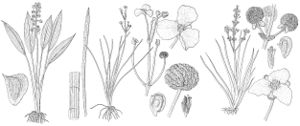Difference between revisions of "Sagittaria platyphylla"
N. Amer. Sagittaria. 29. 1894.
FNA>Volume Importer |
FNA>Volume Importer |
||
| Line 29: | Line 29: | ||
|elevation=0–900 m | |elevation=0–900 m | ||
|distribution=Ala.;Ark.;Fla.;Ga.;Ill.;Ky.;La.;Miss.;Mo.;Ohio;Okla.;Pa.;Tenn.;Tex.;W.Va.;Mexico (Nuevo Le�n;sw Mexico);Central America (Panama). | |distribution=Ala.;Ark.;Fla.;Ga.;Ill.;Ky.;La.;Miss.;Mo.;Ohio;Okla.;Pa.;Tenn.;Tex.;W.Va.;Mexico (Nuevo Le�n;sw Mexico);Central America (Panama). | ||
| − | |discussion=<p>Sagittaria platyphylla has been accepted at the variety level, i.e., Sagittaria graminea var. platyphylla (C. Bogin 1955; J. W. Wooten 1973; E. O. Beal et al. 1982). After studying dozens of populations in the field from much of its range and hundreds of herbarium specimens, we have concluded that this taxon should be recognized at the specific level instead, a conclusion supported by cladistic analyses of morphologic characters (R. M. Kortright 1998)</p> | + | |discussion=<p><i>Sagittaria platyphylla</i> has been accepted at the variety level, i.e., <i>Sagittaria graminea</i> var. platyphylla (C. Bogin 1955; J. W. Wooten 1973; E. O. Beal et al. 1982). After studying dozens of populations in the field from much of its range and hundreds of herbarium specimens, we have concluded that this taxon should be recognized at the specific level instead, a conclusion supported by cladistic analyses of morphologic characters (R. M. Kortright 1998)</p> |
|tables= | |tables= | ||
|references={{Treatment/Reference | |references={{Treatment/Reference | ||
| Line 56: | Line 56: | ||
|publication year=1894 | |publication year=1894 | ||
|special status= | |special status= | ||
| − | |source xml=https://jpend@bitbucket.org/aafc-mbb/fna-data-curation.git/src/ | + | |source xml=https://jpend@bitbucket.org/aafc-mbb/fna-data-curation.git/src/8f726806613d60c220dc4493de13607dd3150896/coarse_grained_fna_xml/V22/V22_439.xml |
|genus=Sagittaria | |genus=Sagittaria | ||
|species=Sagittaria platyphylla | |species=Sagittaria platyphylla | ||
Revision as of 15:58, 18 September 2019
Herbs, perennial, to 150 cm; rhizomes absent; stolons present; corms present. Leaves submersed and emersed; submersed sessile, phyllodial, flattened, to 26 × 0.5 cm; emersed with petiole ± triangular, 21–70.5 cm, blade linear-ovate to ovate, 4.6–16.4 × 0.7–6.1 cm. Inflorescences racemes, of 3–9 whorls, emersed, 2.5–10 × 2–4.5 cm; peduncles 22–60 cm; bracts connate more than ¼ total length, lanceolate, 3–5.5 mm, delicate, not papillose; fruiting pedicels spreading to recurved, cylindric, 0.5–3 cm. Flowers to 1.8 cm diam.; sepals spreading to recurved, not enclosing flower or fruiting head; filaments dilated, longer than anthers, pubescent; pistillate pedicellate, without ring of sterile stamens. Fruiting heads 0.7–1.2 cm diam.; achenes oblanceoloid, not abaxially keeled, 1.2–2 × 0.8–1.2 mm, beaked; faces tuberculate, wings absent, glands absent; beak lateral, horizontal to erect, 0.3–0.6 mm. 2n = 22.
Phenology: Flowering summer–fall.
Habitat: Streams and lakes
Elevation: 0–900 m
Distribution

Ala., Ark., Fla., Ga., Ill., Ky., La., Miss., Mo., Ohio, Okla., Pa., Tenn., Tex., W.Va., Mexico (Nuevo Le�n, sw Mexico), Central America (Panama).
Discussion
Sagittaria platyphylla has been accepted at the variety level, i.e., Sagittaria graminea var. platyphylla (C. Bogin 1955; J. W. Wooten 1973; E. O. Beal et al. 1982). After studying dozens of populations in the field from much of its range and hundreds of herbarium specimens, we have concluded that this taxon should be recognized at the specific level instead, a conclusion supported by cladistic analyses of morphologic characters (R. M. Kortright 1998)
